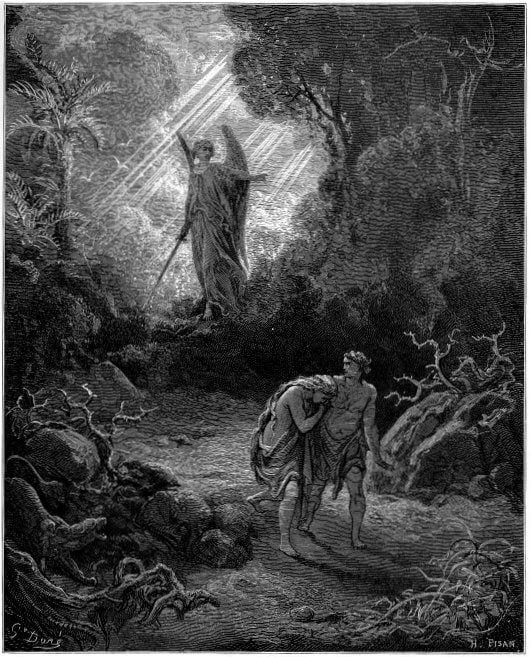I just wanted to defend myself against a few charges.
Sure.
1. I am not a Pelagian, a semi-Pelagian, rank heretic, or anything else. I completely accept the doctrine of original sin.
How do you define it, then?
I just deny that merely inheriting original sin is a sin.
There is the distinction between original sin and actual sin. The former is much more in a corporate sense, whereas the latter is an individualistic thing. We are fallen creatures – even a baby (because it is human; therefore fallen) – , with original sin.
If you can prove from the Bible that merely inheriting original sin as an unborn child is a wrong on our part, I will back down. Notice what Paul said in Romans 5:12, “Death spread to all because all sinned.” It is by our own participation in the sin of Adam, our choosing to do the wrong thing, that seals our fate.
But you need to synthesize Rom 5:12 with its context and the verse I believe I mentioned: 1 Cor 15:22: “. . . in Adam all die” (NIV). Note: “IN Adam,” not “because” of Adam’s original sin, which gave us a propensity, and then we died because of our actual sin,” as you are trying to assert. The Fall is that of the entire human race; we are all in the same boat. Calvin and Luther actually taught a more profound Fall than Catholicism holds, where all free will was destroyed, and man’s very nature became a “sin nature.” Catholics don’t believe that. We think the main effect is concupiscence. But it is there from the beginning, before actual sin occurs. Death itself is a consequence of this; since no human is physically immortal apart from a supernatural resurrection, we are all therefore fallen (Gen 2:17, 3:1 ff.).
There are a host of biblical proofs for this. King David writes:
Surely I have been a sinner from birth, sinful from the time my mother conceived me (Psalm 51:5)
The context of Romans 5:12 abundantly proves this:
Nevertheless, death reigned from the time of Adam to the time of Moses, even over those who did not sin by breaking a command . . . if the many died by the trespass of the one man [Paul then repeatedly contrasts this universal fall with positive parallelism of the grace available in Christ] . . . the gift of God is not like the result of one man’s sin: The judgment followed one sin and brought condemnation . . . by the trespass of the one man, death reigned through that one man . . . the result of one trespass was condemnation for all men . . . through the disobedience of one man the many were made sinners . . .
(Romans 5:14-19 [NIV]; see also 5:20-21)
This is clearly teaching that all human beings were affected by original sin, whether we sin actually or not, contrary to your point of view (which I continue to say is a mild form of semi-Pelagianism). It is not their own (actual) sin which brings this about, but the sin inherited from Adam and Eve, which constitutes the Fall. We have to be saved from this abnormal state. And this is why most Christians have believed in infant and regenerative baptism, precisely because of the effects of original sin, and the need to counter them.
Again, your view (quite typical of Baptist-type and generic evangelical theology) is excessively individualistic. This is not the biblical outlook, which is far more communitarian (and which is behind Paul’s thinking in his repeated analogies between Adam and Christ, in the above passage). Original sin is communal, and in some sense so is salvation, which is why the Bible speaks of whole households being saved, and why we believe that parents can “stand in” for infants. Indeed, in the context of Romans 5, Paul makes the same point, for in Romans 6:2-6 and hinted at after that, he follows through with his analogies by bringing in baptism: we were “buried with him” and then raised with Him in baptism (6:4).
The dominion of the devil is a result of original sin; it caused a catastrophic cosmic disorder (Gen 3:15, Jn 12:31, 14:30, 2 Cor 4:4, Heb 2:14, 2 Pet 2:19). That’s why the theological liberals who deny original sin (if not sin itself) invariably deny the existence of the devil and evil.
The Gnostics and Manichaeans denied original sin by claiming that the moral corruption of mankind came from an external principle of evil. The Pelagians (like you) taught that the sin of Adam was transmitted not by inheritance but merely by the imitation of a bad example. They thought that death, suffering and concupiscence were not punishments for sin, but natural conditions for mankind, which was created in a pure state of nature. And they denied baptismal regeneration and regarded baptism as a sign only. St. Augustine fought against this, and his views were adopted by the medieval Church. Liberal Protestantism denied it.
I am not denying the existence of a propensity to sin inherited from Adam; I just deny that this “propensity” in and of itself is a sin on the part of the infant and is sufficient to send unbaptized infants to hell.
It is in the corporate sense of original sin affecting all, as explained above. The Oxford Dictionary of the Christian Church, in its article on “Original Sin,” explaining St. Thomas Aquinas’s conception (p. 1011), expresses it well:
Acc. to St. Thomas, Original Sin is transmitted not as the personal fault of Adam but as a state of human nature, yet constituting a fault inasmuch as all men are regarded as members of one great organism of which Adam was the first mover. Thus through his sin his descendants incur a culpability similar to that of the hand which executes a murder, moved by the human will. The instrument of transmission is generation.
The only sense I can think of in which it could be a sort of corporate guilt would be a counterfactual statement such as, “We all would have sinned just as Adam did had we been in his position,”
No; you are right that original sin is corporate, but it is also actual, not merely potential. This is the error the Pelagians made, which is why I accused you of that heresy. You are denying the plain teachings of Romans 5.
but as I noted earlier, there are inherent paradoxes in the notion of God judging us by such counterfactuals. And you for the most part agree with me on these issues. I think we agree 99% on this part of the issue:
I think you are in opposition to Romans 5 and Psalm 51 and 1 Corinthians 15:22. But I believe that you can be persuaded of that, because you respect the Bible, and this is classic Protestant teaching, after all, as well as Catholic. It’s not like you have to accept a Catholic view that is rejected by most Protestants.
If you still think I am a heretic after reading this explanation, I would appreciate a brief explanation as to why.
If you can accept the above modification of your views (I think I did provide the scriptural proof that you requested), then I will be happy to retract the charge that you are a heretic, even according to classical Protestantism and most Protestants to this day, let alone Catholicism and the entire unbroken history of the Church. These are crucial, fundamental issues that need to be worked through.














